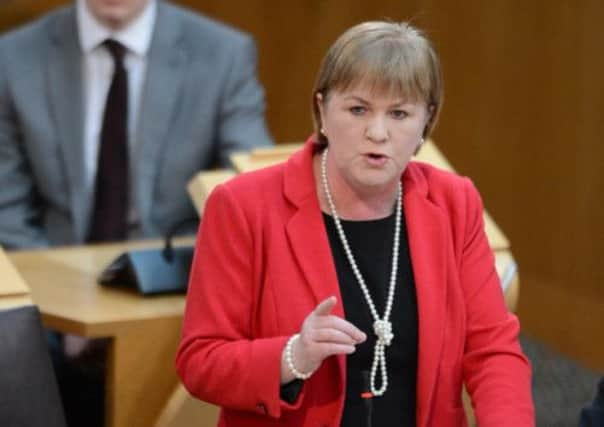Eddie Barnes: Lamont’s devolution power struggle


“This is what gives politicians a bad name, when they’re just talking to themselves,” mutters one leading light in the party. Party conferences often exist in a bubble of their own. This weekend, Scottish Labour is firmly encased within one of its own making.
Yesterday afternoon, party leader Johann Lamont made a valiant attempt to pop it as she used her keynote conference speech to focus on the core issues such as childcare, education and the increasingly urgent need to find ways to make the depleted public purse keep pace with the public’s ever-growing needs. And yet, this being Scotland 18 months before the independence referendum, it is constitutional matters which have dominated proceedings. On Thursday, a day before the conference began, an interim report of the party’s Devolution Commission was published, recommending a major increase in the financial powers held by MSPs. There was, it concluded, a “strong case” for the full devolution of all income tax.
Advertisement
Hide AdAdvertisement
Hide AdIt was an MP – Alistair Darling – who first raised this prospect early last year, when examining how best Labour could show that it could come back from its humiliating defeat to the SNP in 2011 and regain the nation’s trust as the party of devolution. As of Thursday, Lamont is signed up too. But while Darling and Lamont may be a picture of harmony, last week’s call to hand more powers from MPs to MSPs in Scotland has once again highlighted the deep, internal tensions between large chunks of these two groups.
Devo-sceptic MPs are grumbling that they knew nothing of the plans until they were pubished. Ian Davidson, the chair of the Scottish Affairs Committee, was the first over the top, noting the concerns felt by MPs over the plan. In the Eden Court Theatre, their critics showed little patience with the noises off. Dave Watson, of the Unite union, declared: “I would say to those unnamed comrades spitting their dummies out this week, ‘Get over it and engage.’ ”
“It’s just the same old story. They haven’t been paying attention,” notes one delegate angrily. Another adds: “There are three MPs on the Commission. If they wanted to know what was going on, they could just have asked them.”
Lamont has struggled to keep a lid on it all, buffeted by TV and radio interviews in which she declined to say whether Ed Miliband or her party’s MPs were all signed up to the plans. Some heat was taken out of the exchanges on Friday, as she declared that the concrete-looking proposals in the Commission’s report were actually only the beginning of a process which has another year to go. It allowed figures such as shadow defence secretary Jim Murphy – who raised the issue with Miliband after a shadow cabinet meeting last week – to sidestep his own take on the matter by diplomatically noting he would now take part in the consultation. So a temporary armistice appears to have been called.
For the other drinkers on Friday night looking in on the party, the rather arcane nature of the disagreement may well have passed them by. But there is no doubting that the significance of the decision that Labour eventually takes – and the internal division it may spark. If agreed, it would mean that, even if the country says “no” to independence next year, MSPs at Holyrood would have control both over the spending of public money in Scotland and over how to raise much of it. Billy Connolly will no longer be able to suggest the parliament is pretendy. And that leads to some big questions for both party and country. On one level, the debate is about Scottish Labour’s own identity. As one close adviser puts it: “Is it a home rule party or is it a class party?” On another, wider, level, it is about whether Scotland is prepared, with all the risks involved, to sign up to devo with added welly.
Though Darling’s support for the proposals shows that the characterisation of the row as a straight fight between MPs and MSPs is a simplification, it is undoubted that the noises off against Lamont’s proposals have emanated mostly from SW1 over the last week. On one level, there is a self-interested concern; a further extension of Holyrood’s powers, MPs fear, could mean a further cut in the number of Scottish MPs at Westminster, thereby handing the Conservatives a UK general election victory on a plate. On another, there is an irritation with what some see as an act of unnecessary “appeasement” to the SNP and the “threat” of independence, a threat many now see as unlikely to be realised. Then there are the more substantial practical objections over fundamentallly altering the nature of the British state.
A new book published last week, Scotland’s Choices, by three senior academics (including one, Jim Gallagher, who advised Labour on their Commission) spells out some of these real-life issues. A separate Scottish income tax system would be “more challenging” to administer, it notes, thereby increasing the cost of increasing income tax, especially for employers (an entirely separate Scottish tax collection system has been estimated by Finance Secretary John Swinney as costing between £575 million and £625m a year to operate). Then there is the question of whether the UK Government would use the opportunity to scrap the Barnett Formula – the 35-year old method by which money is distributed around the country, which has traditionally benefited Scotland. “If the transfer were calculated according to need,” Scotland’s Choices adds, “Scotland might well lose out.” Many MPs this weekend can be seen nodding in agreement.